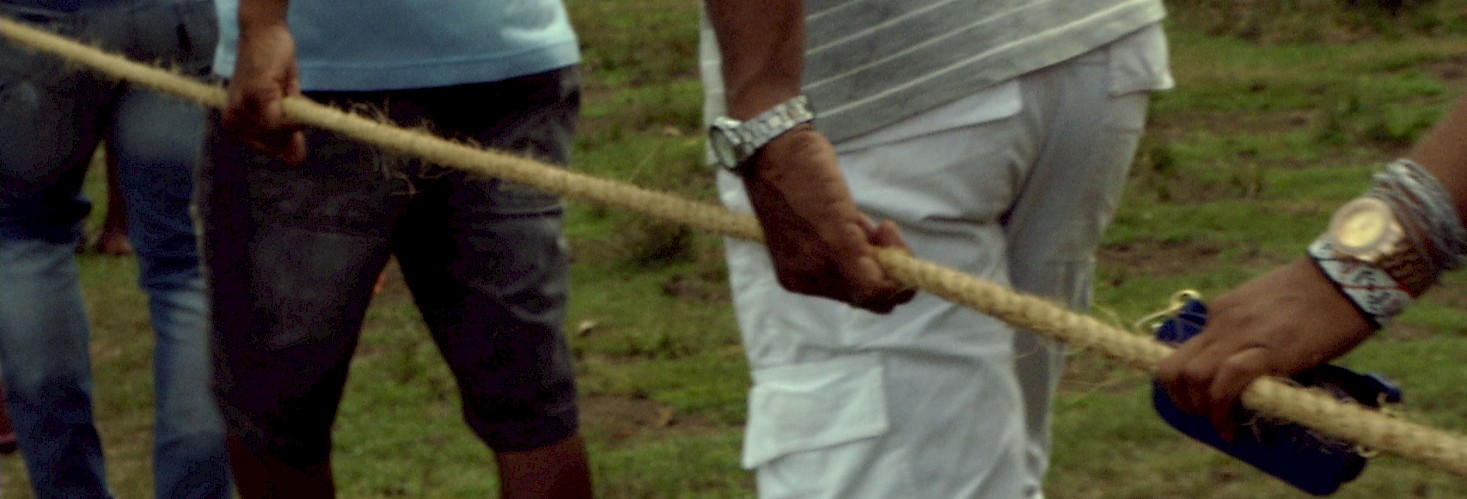Ilha de Marajó
48:12
Pajelança. Spiritism. Círio. Amerindian cultures. Marajó Island. Pará state
Marajó Island
On the one side: Tocantins and Amazonas are what we call two rivers of such greatness that their names have also been used to baptize two entire states in Brazil. On the other side: the Atlantic. And still… there’s so much land. One-story homes under which fresh water and big snakes run through. Transport is combination of bicycles, canoes, and buffaloes! Yes, there are six hundred thousand of these animals that have been brought from Asia around 1890 and have thrived there as no other place in Brazil has ever seen. A place that is home to artistic Indigenous peoples who draw stories on their pottery: marajoaras, Marajó Island natives. A stronghold for enslaved African fleeing in search of faith.

Previously called Mibaraió – or ocean barrier in the original Tupi language – Marajó Island is not designed for beginners: there’s a warning for researchers and the more curious tourists as soon as they board in Belém. It takes at least three hours by boat to get from the Pará state capital to the world’s largest sea-river island: almost twenty-five thousand miles – or the same as Switzerland – of ground held together in space-time by shamans’ prayers and carimbó skirts.
“We believe on leaves, trees, plants.
When we cross a river through a igarapé,
we ask the water for permission
to come through”
Mundinho Coelho

And on the way to boarding, stories will be heard in songs: carimbó is a local rhythm with Indigenous roots that adds melodies to deeds and facts of nature. A fantastic realism that unfolds to the sound of drums and triangles. It’s like writing an epic story about forest beings from Pará… on the memory of the dancing bodies… from the ground and the dust that spinning skirts spread around. There are enchanted pink river dolphins, snakes that deliver sermons, and there are spells, yes, there are!
It’s impossible to prevent yourself from being cradled by the swing of so many waters, so many skirts, and so many sounds. Waters-skirts-sounds that are also mixed with faiths, multiple faiths. Spiritism meets Umbanda meets Pajelança in the living rooms and backyards of a people who are proud – among so many other things – of being mythical.

Cipriano is one of the people who receives Jurema entities, recommends smoking, and repeats Christian prayers to those who seek it for healing and advice. It is all combined with the colors of their clothes’ fabrics, the way they dance, the way they arrange their homes. Harmony with a strong marajoara smile, of people who believe in the invisible.
“When we have an entity,
we don’t remember,
it’s like we’re sleeping”
Pajé Cipriano

And that dates back to the times when everyone living there were Indigenous: and they still are cassava flour eaters, healers with herbs, sons and daughters of the Amerindians of back then… Pajelança is the name given to the group of practices and beliefs learnt from spiritual leaders at Indigenous villages, passed down from generation to generation and integrated into other processions of faith.
Some will say Marajó is the land of enchantments: brief sayings and homemade remedies that cure everything in Brazil. And it is. But it’s also the land of Our Lady of Nazareth who, for the past twenty years, has reached the local church during the Círio. The largest faith-related celebration in Pará state sails through the rivers and the Saint walks among dances and enchanted recipes, among tuned orchestras, through the nights of a place that can hardly be explained.

It’s not for beginners, but it’s impossible to forget; tasting like buffalo milk cheese and fine cassava flour, to the sound of an unlikely narrative. So many interjections with spices and prayers and looks! In a place where no-one walks alone, even plants observe the steps of those who grew brave so they could understand: that the only way is to let go.
interview
Bira & Mundinho Coelho
03:47
Outtakes
Mestre Damasceno
02:20
